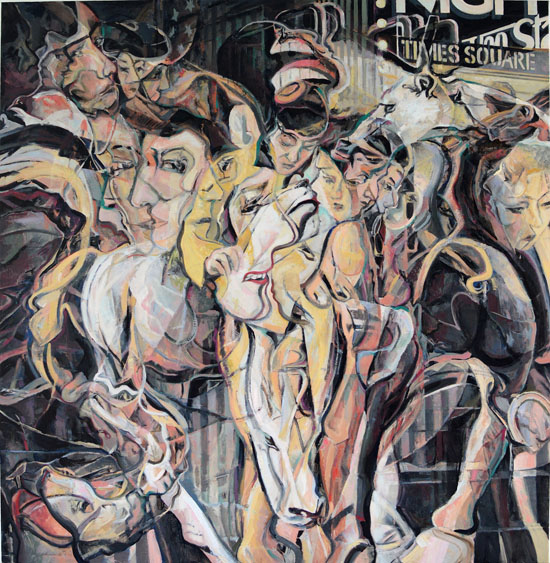Is Solipsism the Weirdest Idea Ever?
by Kenneth Francis (April 2019)

Pearly Head, Clive Head, 2018
About 10 years ago, I was doing research on the philosopher, George Berkeley. I interviewed a Berkeley scholar who said two of his current students were solipsists (a person who thinks he or she is the only mind that exists). I asked him how he felt being viewed as the figment of a student’s imagination, but he had no answer. I could have also asked him, ‘is it moral to murder a figment of your imagination?’ but I didn’t want to ‘put a paranoid stone in his shoe’ or have him look over his shoulder anytime one of the solipsists entered the classroom.
reasonable faith (not blind) and believes in God or that the external world is real and contains other minds.
Read more in New English Review:
• A Big Little Book on C. S. Lewis
• Anthony Powell’s Dance to the Music of Time: First Movement
• Waiting for Corbin
in a dream. This is followed by a sense of panic, as the fear of not waking up and being trapped in the dream for days, if not years (a dream-time minute could feel like an awakened-time year). And the question must be asked: If everything in such a dream state seems real, then how does one prove that our ordinary awakened states are also real?
Once upon a time, I, Zhuangzi, dreamt I was a butterfly, fluttering hither and thither, to all intents and purposes a butterfly. I was conscious only of my happiness as a butterfly, unaware that I was Zhuangzi. Soon I awakened, and there I was, veritably myself again. Now I do not know whether I was then a man dreaming I was a butterfly, or whether I am now a butterfly, dreaming I am a man. Between a man and a butterfly there is necessarily a distinction. The transition is called the transformation of material things.
This short story ponders on how do we know when we’re dreaming, and when we’re awake. What is real or illusion? Another anecdote was told by the great Christian philosopher Alvin Plantinga, when he gave a lecture in 2011 at the Taylor University, Indiana. According to Dr Jay L. Wile, Plantinga started his talk with a few witticisms.
Read more in New English Review:
• Marxism Madness
• GIFs that Keep on Giving
• A Colorful Plastic Blow-up Parrot isn’t a Pencil Sharpener
. . . He talked about the philosophical view called Solipsism, in which one can only be sure that one’s own mind exists. In the most extreme view of Solipsism, the Solipsist is the only real person that exists, and everyone else is simply a construct of the Solipsist’s mind. He said while this might seem silly to many people, it is a serious issue in philosophy. He said that he once met a philosopher who was an extreme Solipsist. He was an elderly man, and everyone in his department took incredibly good care of him. They carried his books and materials when he had to go somewhere, made sure that he ate well, and generally watched out for his well-being. As Dr. Plantinga was leaving the Solipsist’s department, he told someone else in the department how impressed he was that they took such great care of this elderly philosopher. The person replied, ‘We have to take good care of him, because when he goes, we all go!’
Then there was the woman who allegedly said to the philosopher Bertrand Russell, who at the time was a solipsist (paraphrase), ‘Mr Russell, I too am a solipsist, but I wish there was more of us.’
«Previous Article Table of Contents Next Article»
__________________________________
The Terror of Existence: From Ecclesiastes to Theatre of the Absurd (with Theodore Dalrymple).
Follow NER on Twitter @NERIconoclast